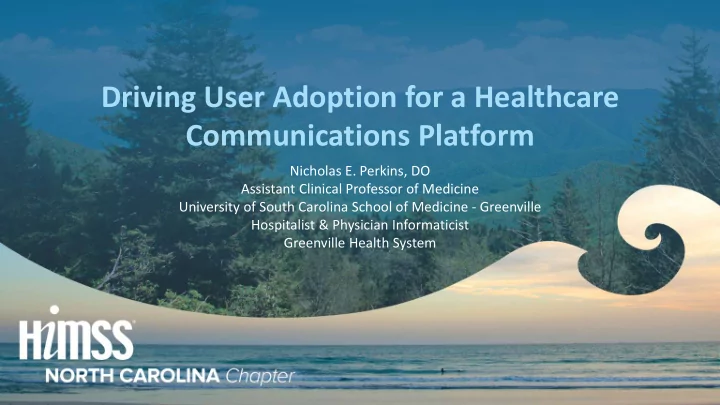

Driving User Adoption for a Healthcare Communications Platform Nicholas E. Perkins, DO Assistant Clinical Professor of Medicine University of South Carolina School of Medicine - Greenville Hospitalist & Physician Informaticist Greenville Health System
Defining the Problem GHS Physician Informatics Study: “Evaluating Changes in Efficiency & Reliability of Provider Communications” regarding current paging/communication system perceptions. OP IP/OP Job Location(s) Job Role Breakdown
Defining the Problem “The current system is a secure communication tool that allows me to relay protected patient information.” Only ~25% knew our old solution was not secure
Defining the Problem “I am able to verify the communication was successfully sent and received.” 54% Never/Rarely 26% Frequently/Always 20% Occasionally
Defining the Problem • 331 respondents • Average 4.79 pages per shift • Cumulative average of 1,703 minutes, or 28.39 hours, are spent paging each shift.*
Implementation Theory Technology Acceptance Model (TAM)
Project Goals • Implement an easy-to-use communications platform • Provide a standardized point of contact • Develop integrations with key systems
Project Goals Success Depends on User Adoption, so we need to align the technology with clinician workflows.
Pre-Rollout Strategy Formation of clinician led discovery team • Review current paging/call systems and communications workflows. • Identify optimal strategies for various departments and roles. • Create a universal system paging protocol to guide further build. • Design hospital rollout timeline. • Largest part of the project thus far.
Pre-Rollout Strategy • Toolset – HIPAA compliant texting/VOIP – Integrated on-call schedules/pagers – Clinician directory – EPIC integrated communications – Hill-Rom communications
Building Improved Workflows • Finding the right provider Via Name Via Scheduling Platform Contacts Directory On-Call Integration
Building Improved Workflows • Connect on- call schedules to “find the right provider.” – All on-call schedules are viewable within Telmediq – Maintenance of on-call schedules can be delegated to administrative office staff Web Console View
Telmediq Project • Finding the right provider 1 2 Alternatively, you can just send the page to the service. The system will automatically pull the correct provider.
Building Improved Workflows • Using the right communication mechanism (Secure Message) Messaging Types Pages automatically allow (Guide required fields & 2-way secure texting alerting/escalation policies)
Building Improved Workflows • Using the right communication mechanism (VOIP/Cellular) Call a virtual service number Call a Both methods reach provider the correct provider directly
Building Improved Workflows • Using the right notifications and escalations – Provide adequate mechanisms to notify a provider. – Align with enterprise paging policies. – Ensure messages are re-routed to another capable provider if the first contact fails for any reason. Mobile Client Settings Admin Interface
Project Pilot • Initial pilot of ~200 users at community hospital – Hospitalist Group (3 MDs, 1 PA Daily). – Nursing, Unit Secretaries, Radiology Techs. – Started Feb 2017,
Project Pilot • Minimize notifications and escalations unless absolutely necessary. • Build out on-call schedule integration before paging roll out. • Design quick tutorials (videos, handouts, 1-page PDFs) for clinicians by role. • Deeper training for those who desire it. – Periodic web conferences • Open door policy for direct communication of recommendations and complaints.
Project Pilot
Project Expansion • Messaging now open to all providers. • Overwhelmingly the system has been readily adopted.
Project Expansion Then Now Messages 100 – 200 daily 500 – 1,100 daily Users ~200 >1,300
Telmediq Project Interested in learning more? Connect with us: Nicholas Perkins, DO Ben Moore, CEO & Founder Greenville Health System Telmediq nperkins@ghs.org ben@telmediq.com Thank you!
Recommend
More recommend